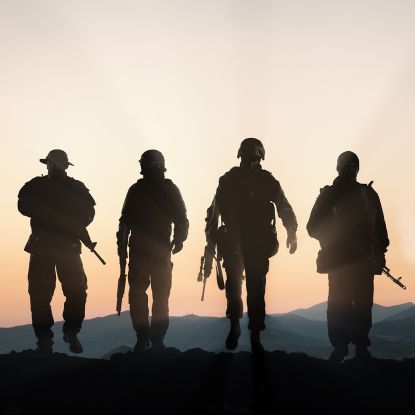
Veterans are at a higher risk of suffering from post-traumatic stress disorder (PTSD) than the general population, and it is the third most prevalent disability for veterans receiving compensation (Reisman, 2016). A study by the RAND Center for Military Health Policy Research (2008), found that less than half of returning veterans needing mental health services receive any treatment at all. Of those who seek treatment only 31 percent to 50 percent of patients achieve clinical success (Steenkamp, et al., 2015). Yet, providing social support during treatment can increase the overall effectiveness of treatment (Price et al. , 2018).
At the Readjustment Counseling Service/Vet Centers two combat veterans shared their experiences of PTSD and treatment with social support (Botero et al., 2020). While they did have different experiences, they did face similar feelings upon returning home from war. Here are their quotes with names changed to protect their privacy.
Mike served in the Vietnam War:
“I wanted to put it all behind me. I didn’t want to think about the war ever. I came home and I worked. I worked until I couldn’t work no more. And now I am working again. I need to stay busy. It stops me from thinking about things. It stops me from thinking about the war. It stops me from thinking about my friends that didn’t come back. I am just so angry. I am always angry. It’s taken a toll on my family. It’s taken a toll on me.”
After serving in the first Persian Gulf War and Iraq, Juan Pablo said:
“It took me a long time to realize that something was wrong. I mean I know what they talk about–PTSD. But I don’t want to be labeled. I don’t want to be diagnosed with something. I’m just me. I’m Juan Pablo. I never wanted to come here. I never wanted to talk to anyone. Can you imagine what people–my family, my friends, colleagues would think of me if they saw me going to see a shrink?”
After receiving help through community-based mental health centers, where veterans can receive readjustment counseling services at no cost, and no limit, in addition to receiving information on benefits, services, and other resources, Mike and Juan Pablo describe their experiences with the services.
Mike: “I’ve been broken for a long time. What’s helped me is knowing that I am not alone. I thought I was alone until I came here. Until I met the brothers in this group and learned that they too have faced the same challenges since coming home. That they have struggled with the memories, the guilt of coming home when so many of our other brothers did not. This group, this place, has helped us understand that we are not alone, that there is support here, that we did what we had to do, got drafted, went to ‘Nam and came home. Homelife was rough–PTSD will do that to you–I mean I am on my fourth marriage, but coming here? It’s brought me peace, it helped me accept the past, and move forward with my life. It’s helped me honor and remember my fallen brothers by finding ways in which I can engage with the community and help other veterans. That’s what it’s all about. Getting better and then helping the next brother get better, and so on. I look forward to coming here. I feel like it is a lifeline in the dark.”
Juan Pablo: “Coming to see you has made a difference in my life. You know that the first time I went to the VA hospital I turned away? There was an older veteran in a walker walking in. I looked at myself and thought what am I doing here? So I left. I didn’t come back for two years until I found the Vet Center. It’s still crazy to acknowledge some days. Am I really here? I actually put all my fears and anxiety away to come here? Compared to some of the other veterans that come into these halls–I am much younger. I still have my life ahead of me. I don’t have it all figured it out yet, but I feel like I am lucky that it's not too late. That I can make a change in my life now, that I can work on putting the pain behind me, accepting what's happened, and getting to a better place so that it's not affecting me and my family. It's really helped me to come here and take a load off. Now I am dealing with my trauma, the frustration, the anger, the nightmares. I am learning how to put it behind me and make peace with it, so it doesn’t control me. I don’t think I can talk to anyone else the same way. It’s different here, like family.”
References
Botero, G., Jr., Rivera, N. I., Calloway, S. C., Ortiz, P. L., Edwards, E., Chae, J., & Geraci, J. C. (2020). A lifeline in the dark: Breaking through the stigma of veteran mental health and treating America’s combat veterans. Journal of Clinical Psychology, 76(5), 831–840. https://doi.org/10.1002/jclp.22918
Price, M., Lancaster, C. L., Gros, D. F., Legrand, A. C., van Stolk-Cooke, K., & Acierno, R. (2018). An examination of social support and PTSD treatment response during prolonged exposure. Psychiatry: Interpersonal and Biological Processes, 81(3), 258–270. https://doi.org/10.1080/00332747.2017.1402569
Reisman M. (2016). PTSD Treatment for Veterans: What's Working, What's New, and What's Next. P & T : a peer-reviewed journal for formulary management, 41(10), 623–634.
Steenkamp, M. M., Litz, B. T., Hoge, C. W., & Marmar, C. R. (2015). Psychotherapy for military-related PTSD: A review of randomized clinical trials. JAMA: Journal of the American Medical Association, 314(5), 489–500. https://doi.org/10.1001/jama.2015.8370

